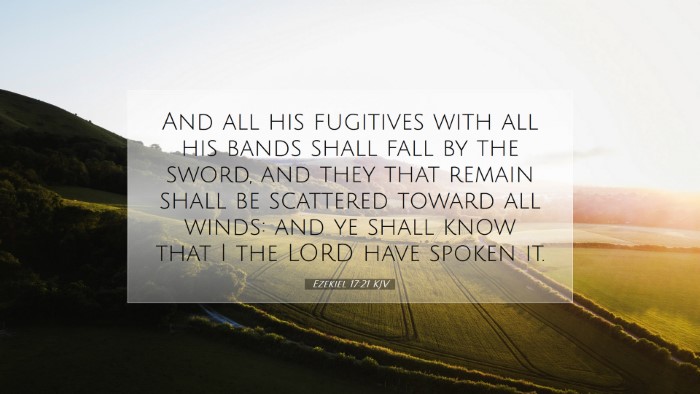Ezekiel 17:21 Commentary
Bible Verse: "And all the fugitives of all thy bands shall fall by the sword, and they that remain shall be scattered toward all winds: and ye shall know that I the Lord have spoken it."
Contextual Background
Ezekiel, a prophet during the Babylonian exile, speaks to Israel concerning their fate and the sovereignty of God over nations. Ezekiel 17 depicts a parable involving two eagles and a vine, which represents the fate of Jerusalem and its leadership. This verse encapsulates the judgment that awaits those involved, particularly focusing on the scattering of the people.
Interpretative Insights
Matthew Henry
Matthew Henry notes the gravity of the pronouncement in Ezekiel 17:21, emphasizing that the "fugitive bands" are representative of the remnant that seeks to escape the consequences of their rebellion. Henry draws attention to the inevitability of divine judgment, asserting that God’s sovereignty ensures that all attempts to escape will ultimately fail. The imagery used here serves to illustrate not only the physical scattering but the spiritual alienation from God.
Albert Barnes
Albert Barnes provides a comprehensive analysis of the context surrounding this verse. He underscores that the phrase "fall by the sword" is a metaphor for the imminent violence and hardship that will befall those in Jerusalem. Barnes posits that this judgment is not merely for the sake of punishment but serves as a divine revelation of God's character. To know the Lord means to understand His holiness and justice and to recognize His authority over human affairs.
Adam Clarke
Adam Clarke expounds on the prophetic implications regarding the "fugitives" and the concept of scattering. He interprets this scattering as a fulfillment of God’s warning to His people about their unfaithfulness. Clarke emphasizes that while this appears to be a tragedy, it is also a form of divine correction intended to return them to faithfulness and recognition of their dependence on God. The scattering signifies not only judgment but also a potential path to restoration.
Theological Implications
Divine Sovereignty
This verse echoes the overarching theme of God's sovereignty, a principle deeply woven throughout Scripture. The judgment pronounced against Israel serves as a reminder of God's control over nations and individuals. The fact that remnants will fall and scattering shall occur brings to the forefront the reality that God's plans cannot be thwarted. Every act of rebellion leads to a consequence that aligns with His divine justice.
Human Disobedience
The response of the people in Ezekiel's time illustrates a recurring biblical theme: the consequences of disobedience. The verse’s summary of judgment serves as a warning to both the contemporary audience and future generations. Pastors and theologians can draw from this the importance of heeding God's warnings and the grave implications of turning away from His commandments.
Scattering and Restoration
In the midst of the judgment, there lies a thread of hope that can be derived from the scattering motif. While the immediate context depicts doom, various prophetic texts also speak of restoration. Understanding this verse requires a holistic view of Scripture, recognizing that God’s disciplinary actions often precede redemption. The latter chapters of Ezekiel lead to the promise of regathering and healing, allowing believers to grasp the fullness of God’s redemptive plan.
Practical Applications
- Understanding Consequences: For pastors, teaching the reality of consequences tied to disobedience is crucial. This verse serves as a reminder to encourage congregants to reflect on their choices in light of God’s commands.
- Encouraging Repentance: The scattering can become a metaphor for spiritual estrangement. Church leaders should provide pathways for repentance and reconciliation with God, using Scripture to guide believers back into fellowship.
- Contemplation of God’s Sovereignty: Biblical scholars and students benefit from meditating on God’s sovereignty over national and individual events, fostering a trust in His ultimate plan amid confusion or turmoil.
Conclusion
Ezekiel 17:21 serves as a sobering reminder of the realities of divine judgment, the consequences of human disobedience, and the hope for restoration. By exploring the insights from Matthew Henry, Albert Barnes, and Adam Clarke, we gain a multi-faceted understanding of the text that is not only academically enriching but also spiritually enlightening for the church today. It challenges believers to recognize the seriousness of maintaining a covenant relationship with the Lord and affirms God's unwavering commitment to His Word and His people.


